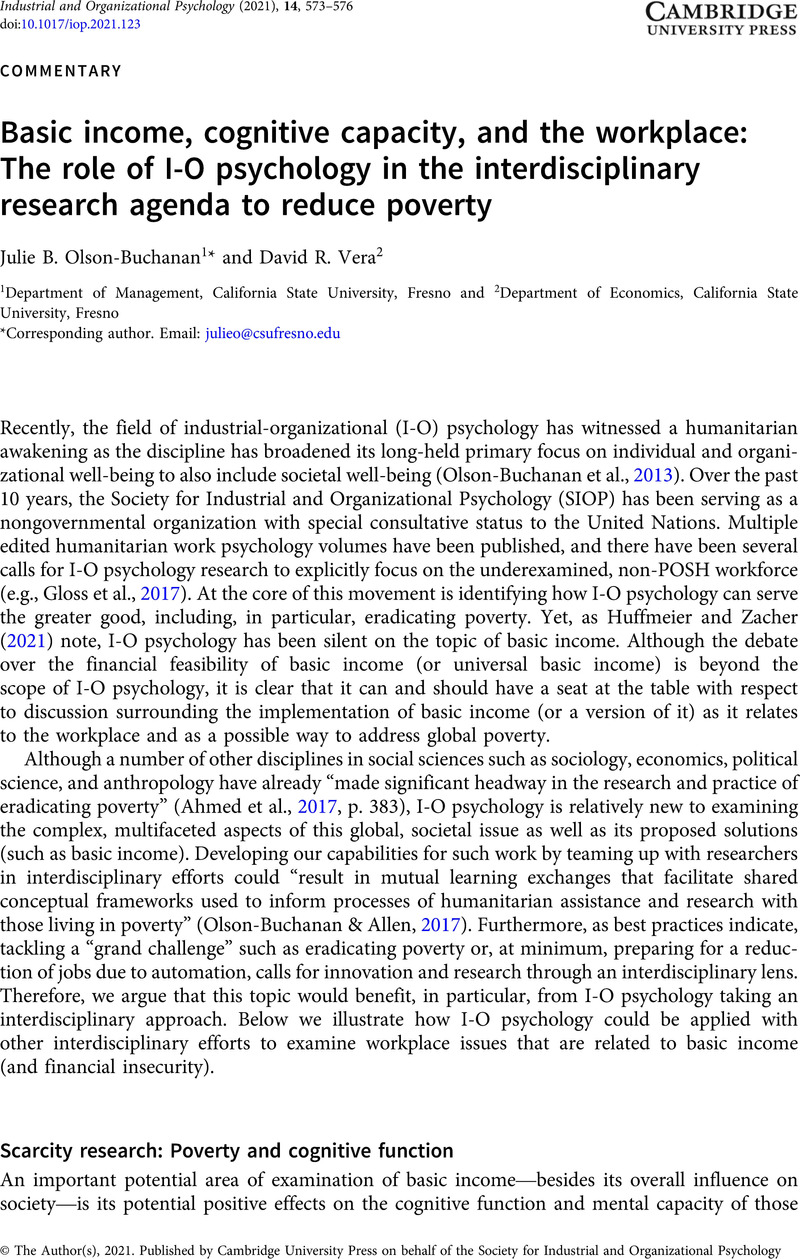No CrossRef data available.
Article contents
Basic income, cognitive capacity, and the workplace: The role of I-O psychology in the interdisciplinary research agenda to reduce poverty
Published online by Cambridge University Press: 14 December 2021
Abstract
An abstract is not available for this content so a preview has been provided. Please use the Get access link above for information on how to access this content.

- Type
- Commentaries
- Information
- Copyright
- © The Author(s), 2021. Published by Cambridge University Press on behalf of the Society for Industrial and Organizational Psychology
References
Ahmed, S., Hoffman, A. J., Mullins, M., & Sywulak, L. (2017). Partnering against poverty: Fighting POSH bias through increased interdisciplinary research and practice. Industrial and Organizational Psychology: Perspectives on Science and Practice, 10(3), 379–384.CrossRefGoogle Scholar
Dilchert, S., Ones, D. S., Davis, R. D., & Rostow, C. D. (2007). Cognitive ability predicts objectively measured counterproductive work behaviors. Journal of Applied Psychology, 92(3), 616.10.1037/0021-9010.92.3.616CrossRefGoogle ScholarPubMed
Gloss, A., Carr, S. C., Reichman, W., Abdul-Nasiru, I., & Oestereich, W. T. (2017). From handmaidens to POSH humanitarians: The case for making human capabilities the business of I-O psychology. Industrial and Organizational Psychology: Perspectives on Science and Practice, 10(3), 329–369.10.1017/iop.2017.27CrossRefGoogle Scholar
Gonzalez-Mulé, E., Mount, M. K., & Oh, I. S. (2014). A meta-analysis of the relationship between general mental ability and nontask performance. Journal of Applied Psychology, 99(6), 1222.10.1037/a0037547CrossRefGoogle ScholarPubMed
Hüffmeier, J., & Zacher, H. (2021). The basic income: Initiating the needed discussion in industrial, work, and organizational psychology. Industrial and Organizational Psychology: Perspectives on Science and Practice, 14(4), 531–562.Google Scholar
Mani, A., Mullainathan, S., Shafir, E., & Zhao, J. (2013). Poverty impedes cognitive function. Science, 341(6149), 976–980.10.1126/science.1238041CrossRefGoogle ScholarPubMed
Olson-Buchanan, J., & Allen, T. (2017). STRETCH goals for I-O psychology. Industrial and Organizational Psychology: Perspectives on Science and Practice, 10(3), 370–376. doi: 10.1017/iop.2017.28
CrossRefGoogle Scholar
Olson-Buchanan, J. B., Bryan, L. L. K., & Thompson, L. F. (Eds.). (2013). Using industrial-organizational psychology for the greater good: Helping those who help others. Routledge.10.4324/9780203069264CrossRefGoogle Scholar
Schmidt, F. L., & Hunter, J. (2004). General mental ability in the world of work: Occupational attainment and job performance. Journal of Personality and Social Psychology, 86(1), 162–173. https://doi.org/10.1037/0022-3514.86.1.162
CrossRefGoogle ScholarPubMed
West, S., Castro Baker, A., Samra, S. & Coltrera, E. (2021). Preliminary analysis: SEED’s first year. www.stocktondemonstration.org
Google Scholar
World Economic Forum. (2020). The future of jobs report 2020. http://www3.weforum.org
Google Scholar
Ziegler, M., Dietl, E., Danay, E., Vogel, M., & Bühner, M. (2011). Predicting training success with general mental ability, specific ability tests, and (un)structured interviews: Ameta-analysis with unique samples. International Journal of Selection and Assessment, 19(2), 170–182.10.1111/j.1468-2389.2011.00544.xCrossRefGoogle Scholar




